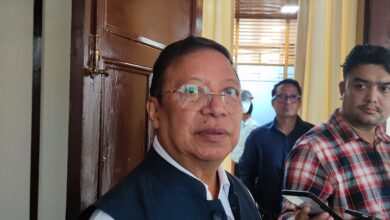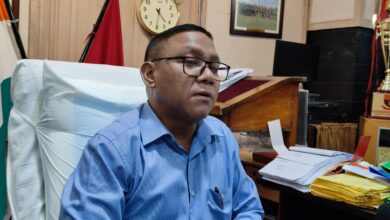Maitshaphrang’s long fight for social reform
Social organisation's founding member Michael Syiem is determined to bring about the changes which he has been pursuing for years now

It was the night of December 31 and the countdown to welcome 2022 was on. The venue: Crinoline Swimming Pool in the city. A group of swimmers, young and old, lined up along the pool ready for a splash. As the clock struck 12, all plunged into the ice-cold water of the pool. Among them was Michael Syiem, the organiser of the midnight swimming event that completed 24 years.
When asked why would he organise such an event in the freezing cold, 66-year-old Syiem, who was still shivering even after changing into warm clothes, was clear about the thought behind this.
“We as members of Maitshaphrang have taken up the challenge by being vocal about issues like the marriage act (the Meghalaya Compulsory Registration of Marriage Act) and equitable property distribution. With this challenging event, we want to start the year with a prayer that God gives us the strength to face any adversity during the course of our fight for the issues,” said Syiem, who is the founding member of Maitshaphrang, a social organisation.
Though Maitshaphrang formally came into being in 1990, the members had been raising questions about social issues from before. Syiem, who was also a founding member of the Khasi Students’ Union in 1978, said as he was fighting against influx of illegal immigrants in the state, he also realised that there was a need for the Khasi society to introspect about the innate problems and question certain practices.
“I had visited many countries and spoken on several platforms on the occasion of World Indigenous People’s Day. During those visits, I interacted with the youth of other indigenous groups from around the globe. It was then that I realised that our society has its intrinsic problems and we need to introspect. We needed some social reformers,” said Syiem who, as a student, was associated with several organisations like the Shillong Students’ Union.
This prompted him and some of the like-minded people to question men’s rights in the society and their inheritance to ancestral property. Maitshaphrang is still fighting for the causes.
Last October, the Khasi Hills Autonomous District Council proposed a bill that was aimed at ending discrimination during distribution of property among the children in a family. The bill is being discussed members of a committee set up by the council.
On whether Maitshaphrang’s fight for justice has had a broader impact in the state, Syiem said the organisation’s continuous campaigns have taken the message to even the young generation. “Theatre has helped us immensely in spreading awareness about the issues,” he added.
Maitshaphrang has organised several street plays, written and directed by Syiem, in the city and on its outskirts. Syiem’s role as a playwright is part of the organisation’s campaign and “I never got time from work to focus more on writing”, he informed.
The organisation has a handful of members but it is not the quantity that they are worried about but the qualitative work that each does. Even when scouting for young leaders, the focus is on dedication to the cause and determination to make a change.

“We do not go asking for funds. We are a self-funded organisation. A big organisation would require more money. So, we focus on quality of the work we do. For a young member in the future, just understanding the problem will not suffice and there has to be devotion to the causes we are fighting for. Future leaders should have genuine intent to take the radical ideas forward,” explained Syiem.
Syiem was also among the activists in the state who fought for right to information and Lokayukta. “There were only seven of us who were fighting for RTI. Many people mocked us and criticised us. We also fought for Lokayukta. Now, both RTI and Lokayukta have been implemented in the state,” he said.
Talking about the challenges in 2022, Syiem said Maitshaphrang will pursue the implementation of the marriage act and take up the issue of equitable property distribution.
Last December, the state Cabinet amended the Meghalaya Compulsory Registration of Marriage Act, 2012, prompting Maitshaphrang to criticise the move. Syiem had said the government’s decision to delete the phrase ‘official purposes’ in the act will defeat the very objective of the act. Maitshaphrang had pointed out that the Meghalaya Compulsory Registration of Marriage Act, 2012, was unanimously passed by the State Legislative Assembly with the aim to deal with the problem of increasing number of unregistered broken marriages which leave many women with children without any financial support.
“Maitshaphrang will approach the government for retaining the principal act by revoking the amendment,” Syiem told Sunday Monitor.
The midnight swimming to usher in 2022 was organised, after a gap of a year owing to the pandemic, with that vision and the dive into the pool with ice chunks was to send out the message. Not all participants in the event were members of Syiem’s organisation but they were convinced about the idea of beginning a new year by setting a challenge for oneself.
“I heard a similar event took place in Mawkyrwat. I also see on social media that many local youths are going on trekking or taking up different challenges in the beginning of the year. This is encouraging,” he said.
Only time will show whether Maitshaphrang will succeed in its endeavour but Syiem and other members of the organisation have set the precedent to question tradition and introspect to grow with time. It is this example that will encourage others to nurture a vision for social reform.
~ Team Sunday Monitor
Photos from Michael Syiem’s Facebook page & by MM
♦ Also read: A solution or a contention
♦ Also read: Ice water plunge to welcome 2022




